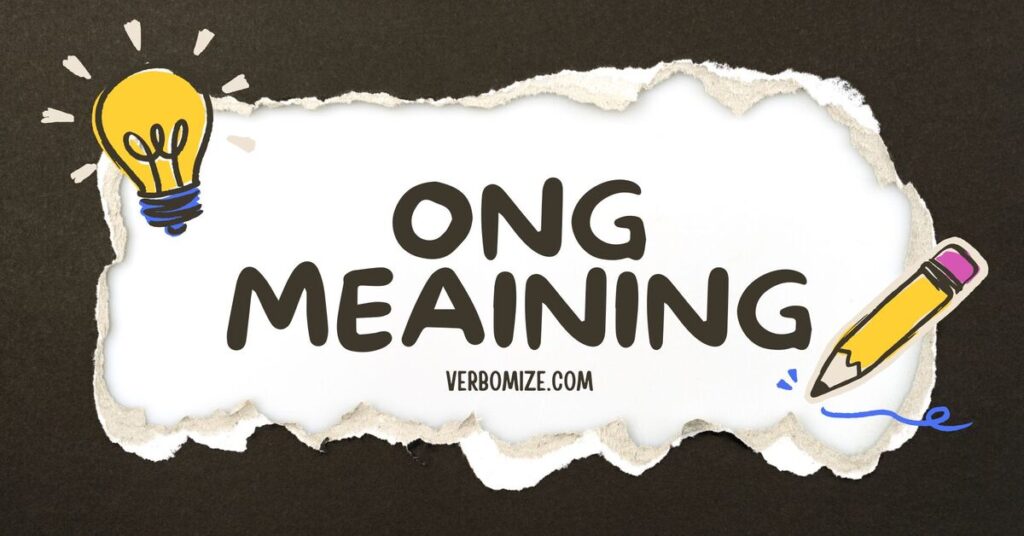ONG Word Meaning—you’ve probably seen it pop up in texts, social media posts, or even heard it in conversation, but what does it really mean? This catchy little abbreviation is all about expressing truthfulness and sincerity, but there’s a lot more to it than just that. If you’ve ever found yourself wondering how and when to use ONG, or why it’s so popular, you’re in the right place!
In this guide, we’ll dive deep into the world of ONG, exploring its origins, uses, and examples. By the end, you’ll know exactly when to drop it into your next conversation, and why it’s become such a favorite in digital communication. Keep reading!
What Does ONG Mean?
A Quick Overview
At its core, ONG is an abbreviation for “On God”, a phrase used to affirm honesty or to emphasize the truthfulness of a statement. It’s essentially a modern way of saying, “I swear” or “I promise.” When someone uses ONG, they are stressing that what they are saying is absolutely truthful, often to give their statement extra weight.
Contextual Variations
While “On God” generally signifies truthfulness, it can also be used in different contexts. Depending on the tone and setting, it can express different emotional nuances. It may reflect:
- Sincerity: “I’m serious about this.”
- Emphasis: “This is the real deal.”
- Conviction: “I swear I’m telling the truth.”
It’s the perfect way to add intensity to your words, particularly in informal communication.
The Origins of ONG
Tracing Its First Uses
The phrase “On God” has roots in African American Vernacular English (AAVE), where it has long been used to express honesty, sincerity, and seriousness. It originally emerged in hip-hop culture, with artists incorporating the phrase into their lyrics as a way to emphasize that they were being truthful or real. Over time, this phrase transcended music and began to appear in everyday speech, especially in online communication.
Cultural and Regional Differences
As the phrase evolved, it began spreading through various cultural communities, particularly among younger generations. While ONG is most widely used in the U.S., the slang has also gained traction in other parts of the world due to the influence of global social media platforms like TikTok and Instagram.
The Rise of ONG in Popular Culture
Early Usage in Social Media and Messaging
The rise of ONG can largely be attributed to social media platforms like TikTok, Instagram, and Twitter, where quick and catchy slang words have become part of daily communication. Influencers, celebrities, and even everyday users began using “On God” in captions, comments, and videos, giving it viral attention.
As users from different corners of the world began to use the term, its reach expanded rapidly. What started as a term popular in smaller social circles soon became a widely recognized phrase across platforms, especially among Gen Z users.
Influence from Pop Culture
Music, specifically hip-hop, played a major role in making ONG a household term. With artists like Lil Baby and Kanye West incorporating the phrase into their lyrics, the slang quickly transitioned from niche subcultures into mainstream conversations. ONG even showed up in memes and viral video challenges, further solidifying its place in internet culture.
When and How Do People Use ONG?
In Casual Conversations
ONG is mainly used in casual conversations between friends, family, or online acquaintances. It’s common to see ONG in direct messages, group chats, and social media posts where users want to assert the truthfulness of their statements. For example:
- “I’m going to the concert tonight, ONG.”
- “I told you she’s the one, ONG.”
In Online Interactions
Texting and online chatting are the primary ways ONG is used. People often use the term when they want to make a bold statement, but don’t want to come off as too formal or rigid. Whether it’s sharing personal experiences, opinions, or simply engaging in online banter, ONG helps to add emphasis and flair to a message.
ONG vs Other Slang Terms
ONG shares similarities with other slang terms like “OMG”, “No Cap”, or “For Real”. However, each of these expressions carries a slightly different meaning. Here’s a quick breakdown:
| Slang Term | Meaning | Usage |
|---|---|---|
| ONG | Affirmation of truth or sincerity (“On God”) | “I’m telling the truth, seriously.” |
| OMG | Expression of surprise or amazement (“Oh My God”) | “I can’t believe it!” |
| No Cap | To state something is true and not a lie | “I’m being honest, no joke.” |
| For Real | Emphasis on truthfulness or seriousness | “That’s absolutely true.” |
Real-Life Examples of ONG
ONG in Sentences
To fully understand how ONG fits into conversation, here are a few examples in real-world contexts:
- “I’ve never met anyone cooler than you, ONG.”
- “This new album is fire, ONG.”
- ” I swear I will be there on moment, no distrust!”
As you can see, ONG is used to emphasize truthfulness, often adding a layer of intensity to the message.
How Tone Changes the Meaning
The way you say ONG—or type it—can change the meaning slightly. A casual, laid-back tone may just convey a sense of sincerity, while a more intense delivery could stress just how strongly you feel about what you’re saying. So, depending on your tone or the context, ONG can be used in various emotional settings.
Related Terms and Synonyms for ONG
Slang Comparisons
There are several slang terms that are similar to ONG and can be used interchangeably in some contexts. For example:
- “No cap” – A common alternative that emphasizes honesty.
- “I swear” – A classic expression with the same meaning.
- “For real” – Another expression used to assert truthfulness.
These expressions work in similar ways, but ONG tends to carry a slightly more emphatic or intense feeling than the others.
The Evolution of Internet Slang
Internet slang is constantly evolving. ONG, like many other slang terms, emerged to meet the needs of a fast-paced, informal digital communication culture. Other terms, such as “LOL” and “BRB,” have faded in usage over time, while ONG shows the ongoing trend of creating simple, catchy abbreviations for everyday expressions.
Who Typically Uses ONG?
Age and Demographic
Younger generations, particularly Gen Z, are the primary users of ONG. This demographic, known for its heavy use of social media and its informal communication style, has embraced the term to add flair and emphasis to their interactions.
Global Usage Patterns
While ONG started in American pop culture, its use has spread globally, thanks to the internet and viral trends. As TikTok and other platforms have made slang more accessible, people from different cultures are starting to incorporate it into their own communications. However, ONG is still most commonly used among English-speaking youth, especially in North America.
Antonyms or Opposites of ONG
Expressions with a Contrasting Tone
While ONG is all about emphasizing truthfulness, there are also terms that convey doubt, skepticism, or dishonesty:
- “Cap” – I swear I’ll be there on time, no cap!.
- “Skeptical” – A formal antonym that expresses doubt about the truthfulness of a statement.
If you ever want to show the opposite of ONG, these terms can provide an interesting contrast in conversations.
Why Is ONG So Popular?
The Power of Simplicity
One of the reasons ONG has gained so much popularity is its simplicity. With social media platforms pushing for quick, snappy communication, abbreviations like ONG are a great fit. They’re easy to use, catchy, and pack a lot of meaning into just a few letters.
The Emotional Impact of ONG
ONG is not just a statement; it’s an emotional amplifier. When someone says, “ONG,” they are not just swearing to tell the truth—they are emotionally involved in the statement. This emotional intensity is part of what makes ONG such a powerful tool in online communication.
Social Media Amplification
Social media platforms like Instagram, TikTok, and Snapchat play a significant role in the spread of slang terms. Influencers and viral memes have turned ONG from a niche expression into a global phenomenon. When influencers use ONG in their posts, their millions of followers often adopt it, further fueling the term’s popularity.
Common Misunderstandings About ONG
Misinterpretations
Because slang terms like ONG can change in meaning depending on context, it’s easy to misinterpret them. For example, someone might think ONG is always used to express anger or frustration, but it’s primarily a way to express sincerity or truthfulness.
Cultural Sensitivities
As with any slang, context matters. Some terms might be offensive in certain cultural settings. While ONG is widely accepted in many parts of the world, it’s still important to consider the people you’re speaking to and whether they might find it inappropriate or confusing.
Tips for Using ONG Correctly
Don’t Overuse It
Like all slang, ONG should be used in moderation. Overuse can dilute its impact and make you sound less authentic. Use it when you really want to stress something as true or important, not as a filler.
Know Your Audience
Not everyone will be familiar with ONG. When in doubt, reserve it for conversations with peers who are likely to understand and appreciate it. Using slang in more formal settings or with people who don’t use it can lead to awkward misunderstandings.
Keep It Casual
ONG is primarily a casual term used among friends and in informal settings. It’s not suitable for formal writing or professional conversations. Stick to using it in texts, social media posts, or casual chats with friends.
Fun Alternatives to ONG
Try These Out
If you’re looking for a change, here are some fun alternatives to ONG:
- No cap
- For real
- Deadass
Each of these expressions has a slightly different vibe but can be used in similar contexts to ONG.
How to Know Which Slang to Use
Knowing when to use ONG versus other terms depends on your audience and the situation. If you want to be especially emphatic, ONG works well. But if you’re trying to convey a more casual or playful tone, something like “No cap” might fit better.
The Impact of ONG on Modern Communication
The Influence of Internet Culture on Language
ONG is a perfect example of how internet slang has shaped modern communication. With platforms like TikTok and Instagram leading the charge, slang terms can quickly gain popularity and become part of everyday language. These shifts in language reflect broader changes in how we communicate in the digital age.
Bridging Gaps in Digital Communication
In a world dominated by short messages and emojis, slang like ONG helps people connect quickly and express themselves concisely. It simplifies communication while adding emotional depth, making conversations feel more real and personal.
Final Thoughts
The rise of ONG highlights how language evolves in response to digital culture. From its roots in AAVE to its widespread use across social media, ONG has become more than just an abbreviation—it’s a symbol of sincerity, truth, and emotional engagement. As slang continues to evolve, ONG reminds us that even in a fast-paced, digital world, language still has the power to make us feel deeply connected.
FAQ About ONG
What Does ONG Stand For?
ONG stands for “On God”, a phrase used to affirm that something is truthful or genuine.
Can ONG Be Used in Formal Settings?
No, ONG is a casual, informal slang term. It should be reserved for texting or online conversations with people who are familiar with it.
Is ONG the Same as “OMG”?
While both ONG and OMG are abbreviations, they have different meanings. OMG is often used to express surprise, while ONG is a declaration of truthfulness or sincerity.

Jone Smith is an experienced blogger and content creator behind Verbo Mize. With a passion for storytelling and insightful commentary, Jone brings a wealth of knowledge on diverse topics. His expertise in blogging, combined with a keen eye for detail, makes his work both informative and engaging, offering readers valuable perspectives on a wide range of subjects.







